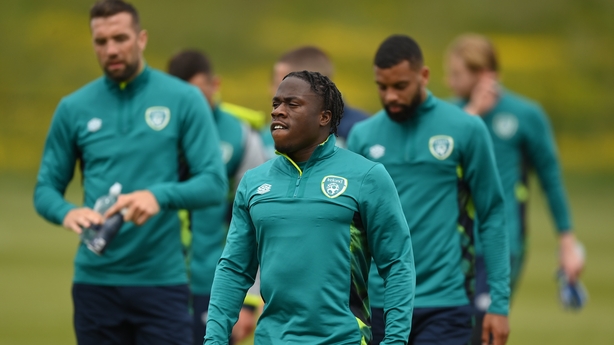Somewhere, buried in the darkest, dustiest corner of Abbottstown is a sad and forlorn looking trophy cabinet.
Blow off the cobwebs and open the creaking door and you won't find much.
There’s the Carling Nations Cup, which was hoisted aloft by Robbie Keane in a half-empty Aviva Stadium in 2011 and the Iceland Triangular Tournament from 1986, when Jack Charlton’s side took on Czechoslovakia and Iceland to win a mini-tournament that’s notable for Charlton’s first ever win as Ireland boss.
If you’re feeling particularly generous, you could throw in the FIFA Fair Play Award from 1997, but that one was for the supporters rather than any on-pitch action, so it’s a bit of a stretch.
All of which goes to illustrate the distinct lack of silverware in Ireland’s cabinet.
Not that the Boys in Green are alone in their barren trophy haul. After all, there’s only one tournament every two years on offer in the shape of the World Cup and the European Championship, and qualifying for those tournaments is a major achievement.
It’s a problem that UEFA set out to solve with the creation of the Nations League – give teams meaningful games and something to play for in the years when there’s no major tournament. Despite all the sniffiness and sarcasm surrounding the launch of the concept, it’s something that’s largely succeeded.
Ireland will go into their League B campaign with games against Ukraine, Scotland and Armenia with genuine stakes and jeopardy, and the prospect of eventually playing for promotion.
It certainly beats the almost traditional end of season friendly against Oman in an empty Lansdowne Road.
Starting away to Armenia on Saturday, and with games home and away against Ukraine, as well as a Dublin clash with Scotland in between, it’s going to be a busy period for Stephen Kenny’s side.
The return fixtures against Scotland and Armenia take place in the end of September, all completed then in only two international windows.
It’s all very neat and tidy, with a compressed enough schedule to ensure interest never drops, and in a summer where we’ve been shorn of a World Cup, it gives an extra edge to international soccer.

Ireland will be chasing top spot in their group and with it promotion to League A next time around, having narrowly avoided relegation to League C in the last campaign.
Qualification places for Euro 2024 are also expected to be up for grabs, having provided qualifying play-off spots for both Euro 2020 and the 2022 World Cup. While UEFA have yet to confirm the exact pathway from the Nations League to the Euros this time out, the competition regulations are expected to be approved and published sometime this month.
Seeding for the forthcoming Euro 2024 qualifiers is also up for grabs, with Ireland capable of landing anywhere between the second and fourth bowl in Frankfurt this October, depending on results.
Originally derided at its launch, the tournament has proved to be a success, doing away with meaningless friendlies and offering teams worthwhile games against opponents of a similar level.
There are subplots and intrigue everywhere you look.
In League A, you have some hugely enticing groups, with Group 2 featuring Spain, Portugal, Switzerland, Czech Republic, and Italy, Germany, England, Hungary in Group 3, so offering the kind of league fixtures usually only seen at the major tournaments.
The winner of each of the four League A teams will progress to next summer’s semi-finals and then final, but the promotion and relegation aspect across all four leagues ensures there’s always something to play for.
Armenia are the perfect example of that and their table-topping efforts in League C last time out sees them move up in the world.
Joaquin Caparros’ side host Ireland on Saturday with revenge on their mind, as memories of the Euro 2012 qualifying campaign still linger in Armenia. A dodgy red card for goalkeeper Roman Berezovsky against Ireland is up there with Thierry Henry’s handball for generating a sense of national injustice.
Elsewhere in the group, the back-to back games between Scotland and Ukraine have added significance following Ukraine's impressive 3-1 World Cup victory over the Scots at Hampden.
It’s one of those quirks of fate thrown up by the draw, but before their Nations League campaigns even begin, the two sides will be facing off for the right to play Wales in for a place in the Qatar World Cup against the backdrop of the Russian invasion of Ukraine.
Ireland will like what they've seen in Hampden, with Scotland looking toothless and vulnerable at the back while Ukraine, for all their impressive attacking players, were relying on a very suspect goalkeeper in the shape of the extremely flap-happy Heorhiy Bushchan.
For Ireland and Stephen Kenny, the Nations League offers a chance to keep the bandwagon rolling.
The Boys in Green go into the campaign off the back of an eight-game unbeaten run with the feel-good factor firmly in the ascendance.
Supporters are back on board in a way that they haven’t been for a long time, and the manager and players have really given them something to get behind, with a buy-in from them towards what the boss is trying to achieve.
Kenny has often talked about the value of momentum when it comes to successful teams and with four competitive fixtures in such a short period of time, the Nations League gives him a genuine opportunity to build on what he’s already created.
The Nations League has already proved many doubters wrong and over the next six games, Kenny will be hoping to do likewise.
Follow Armenia v Republic of Ireland (Saturday, 2pm) via our live blog on rte.ie/sport or on the RTÉ News app. Watch live coverage on RTÉ2 and RTÉ Player commencing at 1pm with live radio coverage on RTÉ Radio 1.
Listen to the RTÉ Soccer podcast on Apple Podcasts, Spotify or wherever you get your podcasts.


